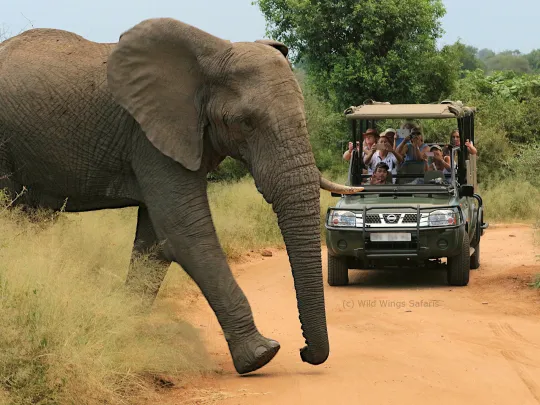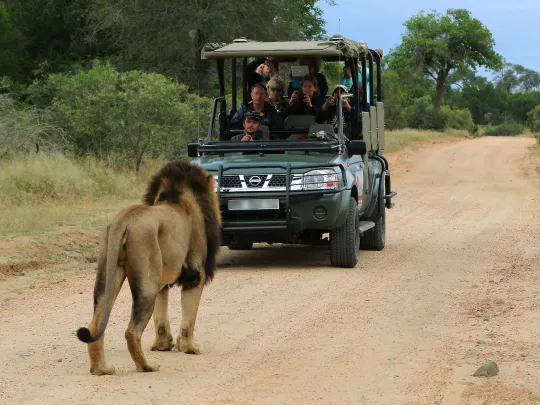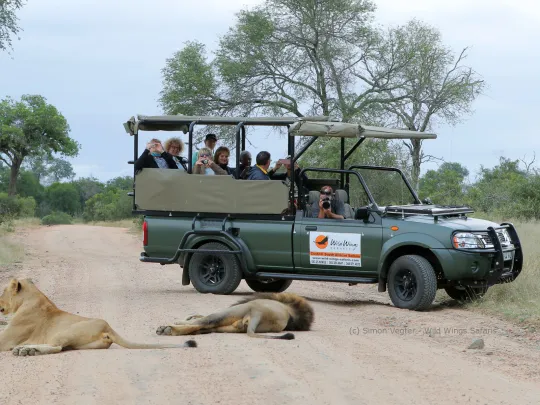How Safe Are Open-Sided Safari Vehicles?
The tragic fatality in Kafue National Park caused by an aggressive bull elephant unexpectedly charging a safari vehicle has people asking: "How safe is it to go on safari in an open-sided vehicle?" Such life-threatening incidents are extremely upsetting but fortunately they are extraordinarily rare. Game drives in open safari vehicles are statistically much safer than driving a car in regular city traffic. Open vehicles provide an immersive, exhilarating experience where guests get to feel the sun on their faces, inhale the scent of the wild, and hear the sounds of birds and wild animals around them.
We've conducted and participated in countless safari drives across the African continent. I can confidently say that going on game drives on open safari vehicles is, by far, the best way to experience Africa's wildlife, and it is statistically a very safe experience.
Before we look at what you can do to keep safe during your game drives, let's look at how safe open-sided safari vehicles are in general, and what role the safari guide plays in ensuring no harm comes to the safari guests on board and the wildlife they encounter on their game drives.
What are open-sided safari vehicles and are they safe?
Open-sided safari vehicles are modified 4x4 vehicles used for wildlife viewing in national parks and game reserves across Africa. They are designed to provide a safe and secure vantage point for wildlife observation, while simultaneously allowing safari guests to engage with the environment on a more personal level, feeling the cool breeze and hearing the sounds of the wilderness without the barrier of glass.
These specially crafted vehicles are sturdy and typically feature an open design, with elevated, tiered seating and no windows or floor-to-roof barriers on the sides, offering unobstructed views of the surrounding landscape and wildlife. Some have a canvas canopy, others are completely open.

Elevated, tiered seating and no windows offer unobstructed views
Despite their open design, these safari vehicles are built with safety in mind. They are designed to withstand the demands of off-road driving and are usually reinforced with sturdy frames and rollover protection.
In addition to being sturdy, robust and reliable, safari vehicles are mandated by law to adhere to a wide range of enhanced safety specifications. These include special permits, stringent statutory safety regulations, and regular safety and roadworthy inspections.
Why the safari guide is pivotal to the safety and well-being of the safari guests
When it comes to the safety and well-being of both safari guests and the wild animals, the importance of being in the hands of a qualified, skilled safari guide cannot be overstated.

Simon, Nicky and Rufus
Safari tours should only ever be led by knowledgeable and experienced guides who are well-versed in wildlife behaviour and park regulations. These guides undergo rigorous training to ensure the safety of guests during wildlife encounters.
For example, to conduct safaris in South Africa's Kruger National Park, one needs to be a qualified and registered guide, have a First Aid Certificate and a Professional Driver’s Permit and be registered with CATHSSETA and the Department of Tourism. Furthermore, after completing the Kruger National Park's orientation and training program, each guide must pass a mandatory assessment.
What you can do to keep safe during your game drives
Usually, when you meet your safari guide, they will give you a safety briefing on game drive rules and safari etiquette. These rules are designed to keep you and the wildlife out of harm's way, so it is essential that you follow the guide's instructions at all times.
The briefing will include common-sense safety protocols such as always staying seated during game drives and not interfering with the wild animals. Don't attempt to call, distract, feed or touch any wild animal and always obey your safari guide's commands. They are experts at reading animal behaviour and understanding the body language of Africa's most dangerous wildlife.

Nicky gives guests a code of conduct briefing before their first game drive
Good safari etiquette requires that you respect all sightings, even for animals you're not interested in. Unless you've booked a private safari, you're likely to be part of a group that will probably include some interests that don't align with yours. This also means keeping your voice down, switching your cell phone to silent and, if possible, not making too many movements.
Open safari vehicle game drives are safe and rewarding
Open-sided safari vehicles allow guides to offer guests intimate wildlife encounters while maintaining a safe distance from animals. It's difficult to fully appreciate the low-frequency rumbling sounds elephants make when they communicate over long distances or the loud snorts and grunts of male impalas during the rutting season from behind closed windows. An open vehicle offers you a totally different, immersive experience of the bush.

Embracing the joy of an immersive safari experience
Guests get to enjoy unobstructed views of the wilderness, allowing them to fully appreciate the natural beauty of their surroundings, including the sounds and smells of the bush. Wildlife photographers get to capture stunning photographs without interference from windows or barriers.
The very essence of the safari experience is being outside, in the open, either on foot enjoying a guided bush walk, or on the back of an open safari vehicle.
What is the risk?
Thousands of open-vehicle game drives are conducted all over Africa every day. One seldom hears of a vehicle being attacked. It can happen, and when it does it usually involves elephants. But in most cases, the guide is able to read the situation before it escalates and back off or drive away in time. According to a media statement following the tragic incident in Kafue, driving away on that occasion was allegedly impossible because the vehicle was off-road and the escape route was blocked by vegetation.
While the regrettable tragedy in Kafue National Park serves as a sobering reminder of the inherent risks of wildlife encounters, it's crucial to remember that such incidents are exceedingly rare. Statistically, you're safer on a game drive in Africa than on the congested roads of any major city.
With their emphasis on safety, open-sided safari vehicles still provide the safest and most authentic means of embracing the joy of an African safari.
You may also want to look at

3 Day Kruger Park Safari
Our popular 3 Day Kruger Park Safari is designed for those who want a quick and affordable way to experience the incredible wildlife of the Kruger National Park in the company of an expert guide. With regular scheduled departures from Johannesburg or Nelspruit, custom departure dates and private departures can also be arranged on request. Book early to avoid disappointment!

4 Day Kruger Park Budget Safari
Our 4 Day Kruger Park Budget Safari is a cost-effective yet authentic way to experience South Africa's most famous wildlife destination. This small-group safari departs regularly from Johannesburg or Nelspruit, offering expert-guided open-vehicle game drives and comfortable en-suite accommodation inside Kruger National Park. Book early to secure your spot!

5 Day Best of Kruger Safari | Classic Big Five Adventure
Discover the ultimate Kruger National Park safari on this 5-day African safari, featuring open vehicle game drives, a guided bush walk, and an exciting night safari. Stay at two different camps in Southern Kruger Park, maximising your chances of spotting the Big Five—lion, leopard, elephant, rhino, and buffalo—as well as cheetahs, wild dogs, giraffes, zebras, and abundant birdlife. Whether you're looking for an affordable Kruger Park safari or a well-rounded Kruger Park tour, this is one of the best Kruger safari options available.
About the author

Dianne Kokkonidis was born in Johannesburg, grew up in the Transkei and spent years exploring Europe. She returned to South Africa to live on a farm in the Outeniqua Mountains when the call of Africa got too loud to ignore. She comes from a family of storytellers, so it's no surprise she's now found her way into writing about one of the oldest stories known to mankind - the lure of Africa.









